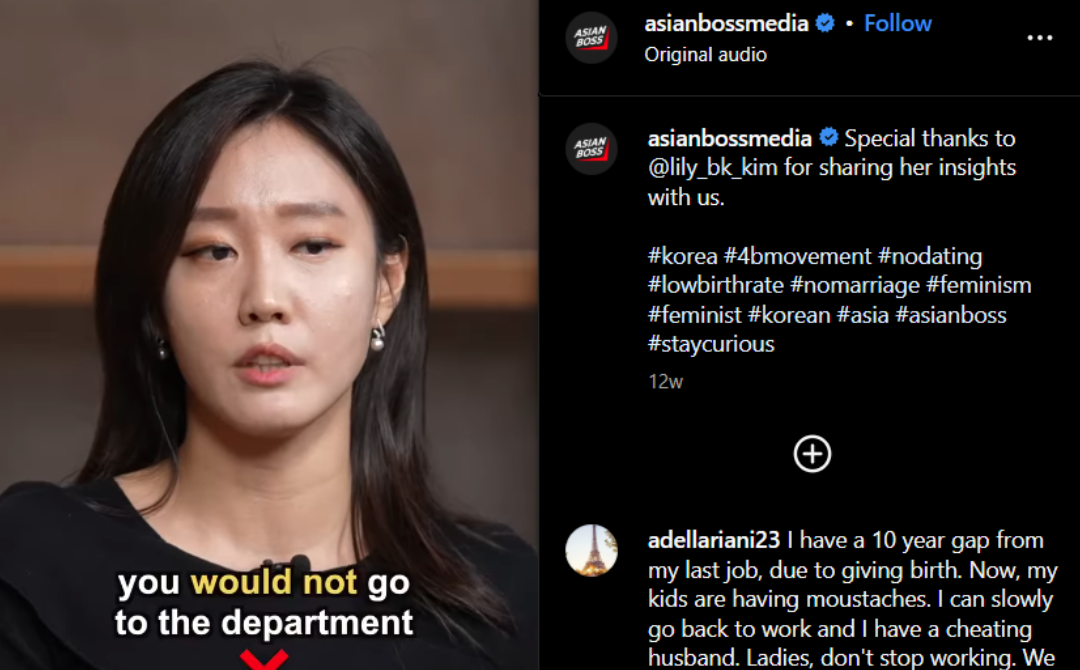The 4B Movement: A response to South Korea’s low birth rate and economic pressures
Projections from Statistics Korea indicate that South Korea's fertility rate will reach a critically low level of 0.68 in 2024, a significant cause for concern.

SHAH ALAM – The "4B Movement," a growing trend among young South Korean women, reflects a growing disillusionment with traditional relationships and societal expectations.
This movement, characterised by its four principles – Biyeonae (no dating men), Bisekseu (no sexual relationships with men), Bihon (no marriage with men), and Bichulsan (no childbirth with men) – has emerged amidst a backdrop of social and economic challenges.
This movement is also closely linked to South Korea’s alarmingly low birth rate, which has become the lowest among the Organisation for Economic Co-operation and Development (OECD) countries, signaling a looming demographic crisis.
In 2023, the country recorded an all-time low fertility rate of just 0.72 births per woman, far below the replacement fertility rate of 2.1.
Projections from Statistics Korea indicate that South Korea's fertility rate will reach a critically low level of 0.68 in 2024, a significant cause for concern.
However, South Korean news anchor Bokyoung Kim emphasised that the 4B movement isn’t the only factor behind these worrying numbers.
She highlighted that skyrocketing housing prices and the overwhelming cost of childcare are critical barriers preventing many women from pursuing marriage and parenthood.
“For instance, unaffordable house prices and the burden of childcare, even while working, are the main reasons why they don’t want to have children.
“However it’s not that they don’t want to date or have relationships with men.
"It’s a bit more complex, and we need to look at it from a different perspective,” she said in a YouTube video on the channel @Asian Boss, titled ‘The Infamous “4B Movement in Korea Explained,’ posted last year.

Kim also pointed out that workplace discrimination exacerbates the problem.
Women with children, she explained, are often expected to prioritise family responsibilities over their careers.
In some cases, companies penalise women for having children by excluding them from important projects or career advancement opportunities.
In the worst cases, this pressure forces women to quit their jobs altogether.
Kim linked the 4B movement to significant events that have shaped feminist activism in South Korea.
A pivotal moment was the 2016 Gangnam Station murder, in which a woman was fatally attacked by a man with deep resentment toward women.
This tragedy exposed the pervasive misogyny in South Korean society and triggered a wave of feminist activism, particularly among younger generations.
Following the incident, campaigns such as the "Corset-Free Movement" emerged, encouraging women to reject traditional beauty standards and societal expectations.
Online platforms like Megalia became spaces for women to organise and express their frustrations, often using a “mirroring” strategy to confront gender biases.
"For instance, when men commented on how women should dress, women would respond with similar remarks, turning the logic back on them," Kim said.
Despite its influence, the feminist movement has faced internal conflicts and political challenges.
Disagreements within online communities over the definition of feminism, as well as scandals involving prominent liberal politicians accused of sexual misconduct—such as former Seoul Mayor Park Won-soon—have caused public disillusionment.
The backlash against feminism has also given rise to conservative movements, with some young men claiming reverse discrimination.
This sentiment has fueled support for conservative parties, like the People Power Party (PPP), which oppose feminist policies.
High-profile scandals, including the Nth Room case—which involved the exploitation of women in secret online chat rooms—have further deepened distrust in relationships between men and women.
“The Nth Room scandal left many women feeling unsafe, reinforcing their desire to avoid relationships with men altogether,” Kim added.
Download Sinar Daily application.Click Here!















